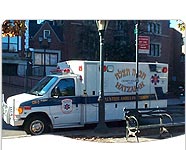 
New Guidelines for Prevention of Recurrent Stroke
TUESDAY, Jan. 31 (HealthDay News) -- Transient ischemic attacks (TIAs) should be treated just as aggressively
as stroke in patients who have a history of stroke or TIA, and diagnostic work-ups and therapy should be equally
aggressive, according to new guidelines published in the February issue of Stroke. The guidelines also address
stroke risk in specific populations, such as pregnant women or ethnic minorities.
For example, the elderly, blacks, Mexican Americans and members of lower socioeconomic groups are at high
risk of recurrent stroke and may face barriers to care, according to the guidelines. In addition, hormone replacement
therapy should be avoided in postmenopausal women to prevent vascular events.
The guidelines also contain recommendations on modifiable risk factors including smoking, alcohol, obesity and a
sedentary lifestyle. Medical options such as the use of anticoagulants and antiplatelet agents, and interventions such
as carotid artery surgery or angioplasty are also addressed.
The guidelines were developed by a committee chaired by Ralph L. Sacco, M.D., M.S., of Columbia University Medical
Center in New York, for the American Heart Association and the American Stroke Association Council on Stroke. The
guidelines are co-sponsored by the Council on Cardiovascular Radiology and Intervention and affirmed by the American
Academy of Neurology.
|









